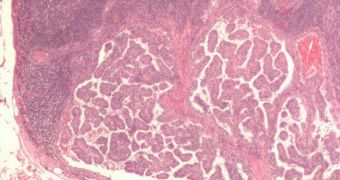In a study funded by the Canadian Cancer Society Research Institute and the Canadian Institutes of Health Research, researchers discovered that the protein S100A10 is critical for the growth of tumors during the last phase of cancer.
Metastatic growth is a term referring to the development of tumors at many locations around the human body, not just the original site. Metastasis occurs when the original tumor becomes large enough that it begins to shed cancer cells into the bloodstream.
These cells then migrate to most major organs – including liver, pancreas, lungs and the brain – where they set up secondary tumors. In this stage of the condition, the cancer is referred to as generalized, and is generally no longer treatable.
Scientists at the Dalhousie University in Nova Scotia were recently able to determine that the biology of cancer is in fact significantly more complex than originally thought. If confirmed, their new discoveries could lead to the development of new approaches to inhibiting tumor growth.
One of the most important discoveries in the study was that fact that proteins on the surface of immune system cells called macrophages are responsible for boosting tumor spread and development. The protein – called S100A10 – powers the movement of cancer cells as they spread throughout the body.
Details of the study were published in the latest issue of the American Association for Cancer Research (AACR) journal Cancer Research. The lead researcher on the study was David Waisman, PhD.
The expert holds an appointment as the Canada Research Chair in Cancer Research at Dalhousie, and is also a Departments of Biochemistry and Molecular Biology and Pathology professor at the university.
“We used to think that the only cells that mattered in a tumor were the cancer cells, and that’s it, but now we are beginning to see that other cells must collaborate with cancer cells to drive tumor growth and permit an evolution of the cancer cells into metastatic cells,” he explains.
“This change is what causes poor prognosis and ultimately what kills the patient,” the expert adds. He says that tumors can not develop and grow without the assistance of macrophages. What experts have always wanted to know was how these macrophages moved into the tumor cell.
“We found that the protein, S100A10, acts like a pair of scissors on the outside of the macrophages that empowers the macrophages with the ability to chew their way through tissues and enter the tumor site where they release substances that stimulate cancer cell growth and metastatic evolution,” Waisman adds.
In the future, this knowledge will be used to create new approaches for delivering anti-cancer drugs straight inside tumors, destroying them from within. However, the research is only in its earliest stages.

 14 DAY TRIAL //
14 DAY TRIAL //